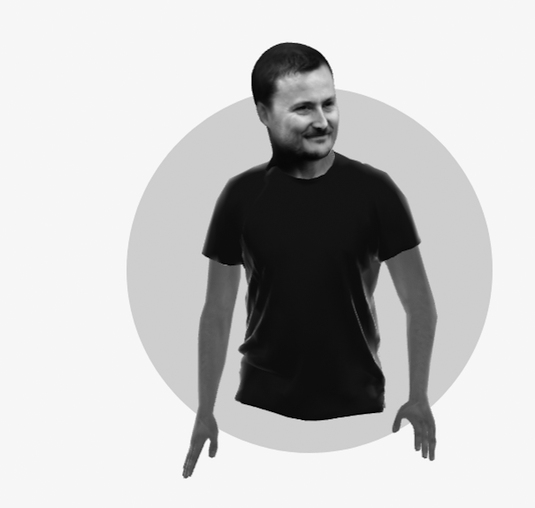At a time when COVID-19 has severely limited the possibilities for experiential learning, students in the coming McLuhan Seminar in Creativity and Technology will spend one class flipping through the pages of the Leonardo's Codex on the Flight of Birds and another learning how to actually fly.

Never one to shy away from a challenge, Dr. Paolo Granata, who teaches the first-year course at the University of St. Michael's College, has re-thought the delivery of his program, an exploratory course designed to explore how creativity and technology make innovation possible. Now, all 20 participants in the winter semester class will participate via virtual reality (VR) headsets provided by the University.
The headsets will connect students to specially created virtual worlds. Students will participate as avatars, graphics representing who they are, with the only real reflection of participants being their voices. Rather than learning strictly through books and lectures, students will be able to immerse themselves in a place, able to wander around even dancing or bringing props, if desired as they interact with new worlds. Each class will take place in different setting, places Dr. Granata describes as "hyperreality, a series of virtual worlds built for and by the students, to foster a sensory-based interactive learning and engagement."
For the uninitated, hyperreality is a term coined by French sociologist Jean Baudrillard, and it refers to the inability to distinguish between reality simulated reality. For Dr. Granata, hyperreality offers the opportunity to "rethink how we experience ourselves.
"The virtual world does not mean a fake world. Students will be able to experiment creatively with the impossible," he says. "This is not just trying to replicate reality. That doesn't make sense. VR provides us with a tangible way to get in touch with the intangible. This is something different."
While in reality humans cannot fly, for example, once students in the class don their headsets, they will be able to experience flight in the hyperreal world they have entered, flying to a mountaintop to experience a new place to converse, with a whole new perspective. And because a virtual world can take participants anywhere, a week on the innovation and creativity of the Renaissance, for example, will see students accessing the Gutenberg press, which introduced the world to moveable type. Another week, students will build their understanding of McLuhan's famous Global Village, bringing their diverse experiences and backgrounds into the classroom in a whole new way.
"All worlds will be McLuhan-inspired, with emphasis on creativity and the unconventional," Dr. Granata explains. Because the seminar is based on the theories of the famed media theorist and former St. Michael's professor, who famously said, "I don't explain. I explore," great emphasis will be placed on sensorial experiences. One class, for example, will be focused exclusively on an "acoustic space" where there is nothing to see. Participants will rely on sound, and reflect on how we interact with each other.
"That simply isn't something I could not do in the regular classroom," he says. "This allows us to push the boundaries of imagination, the boundaries of how we learn."
While virtual reality has been used in the sciences, there are endless applications for the humanities, whether for a philosophy student who wanders down to the Piraeus with Plato or an English major transported to Elizabethan England to engage with Shakespeare.
"A virtual world offers the playfulness that McLuhan spoke of; we can be taken back in time and space, helping us to understand how we use our senses. Artists have always taken emerging technology to fire the imagination," Dr. Granata says.
In a seminar that will expand accessibility to new worlds, Dr. Granata is conscious that virtual reality is not for everyone. For those students who are uncomfortable with a VR headset, he is able to broadcast the virtual class in 2D, ensuring the learning concepts are open to all students.
One of his goals for the McLuhan Seminar, one of the most popular First-Year programs at the University of Toronto, is to see the boundaries of creativity and imagination pushed, taking students to different places to allow them to engage and alter those worlds, discovering emotional memory, the remembrances that take us beyond mere data to include the memory of feelings, as well.
Dr. Granata credits St. Mike's with "pioneering a bold new approach, something groundbreaking. With the growing availability of less expensive VR headsets, VR seems to be the solution at hand, if not a paradigmatic shift, to reimagine experiential learning in a post-pandemic world," he says.
Once the course is completed in the spring, a public space will be created in virtual reality via the McLuhan Salons, a project designed to link the university classroom and the community, to keep the discussions going.
"We are not just doing this for ourselves, but we are thinking about something inclusive and accessible for the common good," he explains. "VR can be an interface, a way to share activities on campus, a way to welcome people to campus.
"Who knows? Someday, we could offer conferences in VR. We could even convocate in VR."













